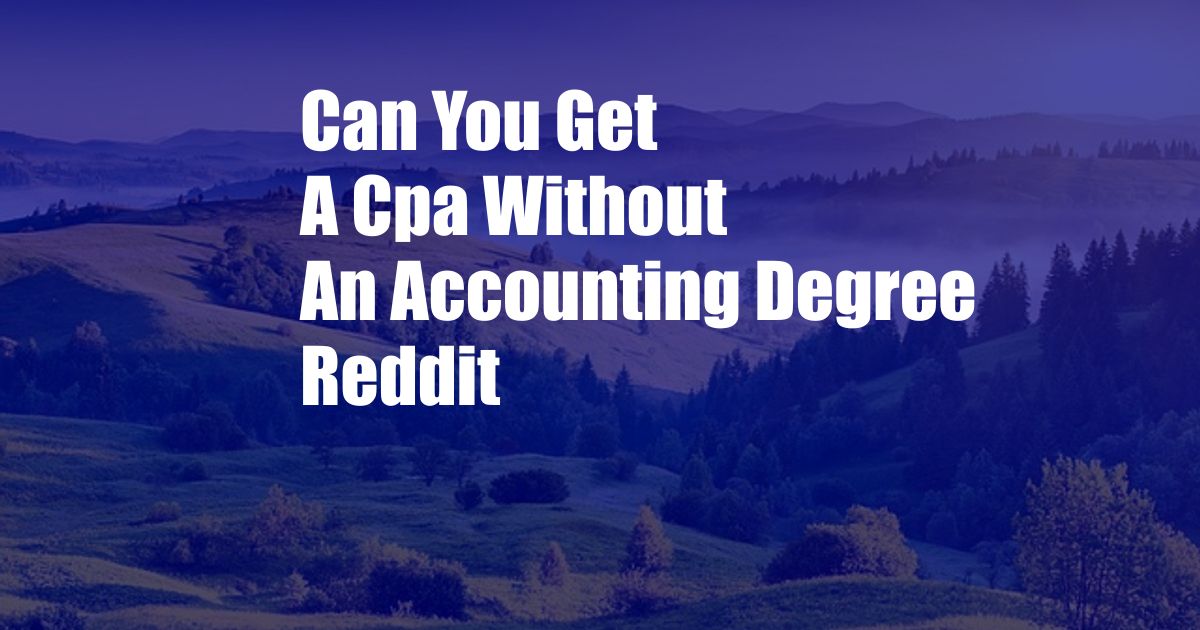
**Becoming a CPA Without an Accounting Degree: Unveiling the Path Less Traveled**
Growing up, I’ve always been fascinated by the intricate world of numbers and financial analysis. The allure of pursuing a career in accounting captivated me, but like many, I lacked a formal accounting degree.
Undeterred, I embarked on a journey to explore if it was possible to become a Certified Public Accountant (CPA) without the traditional educational background. My quest led me down a path of determination, resilience, and unconventional approaches that I am eager to share with you today.
**The Non-Traditional Route to CPAhood**
Contrary to popular belief, obtaining a CPA license does not necessitate an accounting degree. While it remains the most common path, numerous states and jurisdictions recognize alternative qualifications that allow individuals from diverse backgrounds to enter the profession.
This non-traditional route often entails fulfilling specific educational and experience requirements, including obtaining a bachelor’s degree in an unrelated field, completing coursework in accounting, and accumulating relevant job experience under the supervision of a licensed CPA.
**Educational Requirements**
Candidates pursuing the non-traditional CPA path must complete a minimum number of college-level accounting courses, usually ranging from 24 to 36 semester hours. These courses typically cover core accounting concepts such as financial accounting, managerial accounting, auditing, and taxation.
Some states may require additional coursework in business or economics, while others may accept a combination of work experience and education to fulfill these requirements. It’s crucial to research the specific educational criteria mandated by the state in which you intend to practice.
**Experience Requirements**
Beyond educational qualifications, states typically demand candidates to accumulate a certain amount of relevant work experience under the guidance of a licensed CPA. This experience typically involves performing accounting tasks such as preparing financial statements, conducting audits, or providing tax advice.
The required experience varies widely, ranging from one to four years, and may include both public accounting and private industry experience. It’s important to document and track your work experience thoroughly, ensuring it aligns with the requirements for CPA licensure in your state.
**CPA Exam: The Ultimate Test**
Regardless of your educational background, all CPA candidates must pass the Uniform CPA Examination (CPA Exam). This comprehensive four-part exam assesses candidates’ knowledge of auditing and attestation, financial accounting and reporting, regulation, and business environment and concepts.
Passing the CPA Exam requires meticulous preparation and dedication. Most candidates opt for structured exam prep courses or hire tutors to supplement their independent study. The key to success lies in consistent practice, thorough understanding of the exam content, and effective time management.
**Latest Trends in Non-Traditional CPA Qualification**
The accounting profession is constantly evolving, and so are the pathways to CPA licensure. In recent years, we’ve witnessed a surge in online and distance learning programs tailored specifically for non-accounting graduates seeking CPA certification.
These programs offer flexibility and accessibility, allowing professionals to pursue their CPA aspirations while balancing work and personal commitments. Moreover, many colleges and universities now provide bridge programs that seamlessly transition candidates from non-accounting degrees into accounting master’s programs.
**Expert Advice for Non-Traditional CPA Candidates**
Based on my personal journey and interactions with fellow non-traditional CPA candidates, I’ve compiled some invaluable tips to guide your path:
1. Embrace Challenges: This route requires resilience and a willingness to overcome obstacles. Embrace challenges as opportunities for growth and learning.
2. Seek Mentorship: Find a licensed CPA who can provide guidance, support, and valuable insights throughout your journey.
3. Network and Connect: Attend industry events and connect with accounting professionals to build your network and gain industry knowledge.
**FAQs on Non-Traditional CPA Licensure**
Q: Can I become a CPA without any college education?
A: No, most states require a bachelor’s degree, even if it’s in a non-accounting field.
Q: How long does it take to become a CPA without an accounting degree?
A: The timeframe varies based on your pace of completing educational and experience requirements, as well as the time it takes to pass the CPA Exam.
Q: Is it harder to become a CPA without an accounting degree?
A: While challenging, it’s not necessarily harder. With dedication, perseverance, and proper preparation, you can overcome the hurdles.
**Conclusion**
Pursuing the CPA credential without an accounting degree may seem daunting, but it’s certainly achievable with determination and the right approach. By embracing the non-traditional path, you’ll embark on a rewarding journey of professional growth and personal fulfillment.
Are you ready to become a CPA? Share your thoughts and questions in the comments below.